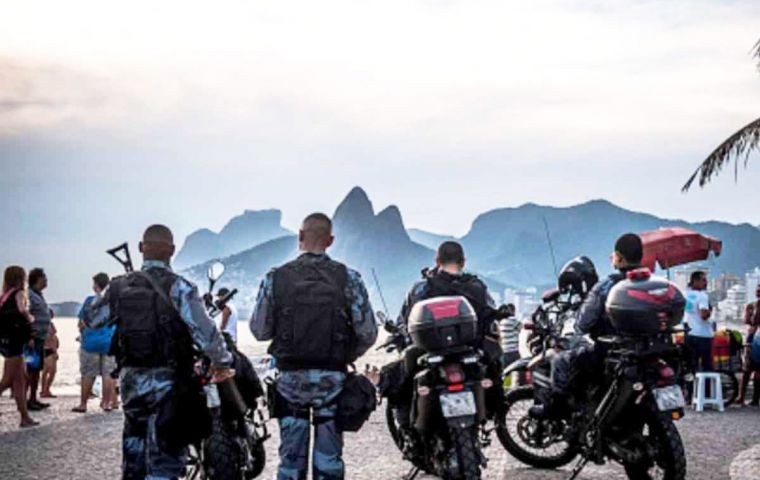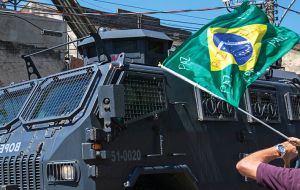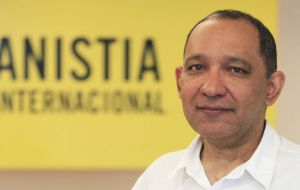MercoPress. South Atlantic News Agency
“Shoot first, ask questions later”, the Rio do Janeiro military police procedure
 Amnesty International launched on Monday statistics and analysis of police killings, ahead of the one-year countdown to the 2016 Rio Olympic Games.
Amnesty International launched on Monday statistics and analysis of police killings, ahead of the one-year countdown to the 2016 Rio Olympic Games.  “There was a crime, there was a death, but there was never any conviction”, reveals that 1,519 homicides were committed by on duty police officers in 5 years
“There was a crime, there was a death, but there was never any conviction”, reveals that 1,519 homicides were committed by on duty police officers in 5 years  “Rio is a tale of two cities. On the one hand, the glitz and glamour, on the other, a city that is decimating young, black and poor men” said Atila Roque
“Rio is a tale of two cities. On the one hand, the glitz and glamour, on the other, a city that is decimating young, black and poor men” said Atila Roque Military police in Rio de Janeiro who seem to follow a “shoot first, ask questions later” strategy are contributing to a soaring homicide rate but are rarely investigated and brought to justice, Amnesty International said on Monday as it published exclusive statistics and analysis ahead of the one-year countdown to the 2016 Rio Olympic Games.
The report “You killed my son: Killings by military police in Rio de Janeiro”; and “There was a crime, there was a death, but there was never any conviction”, reveals that nearly 16% of the total homicides registered in the city in the last five years took place at the hands of on-duty police officers - 1,519 in total. Amnesty International said that only in the favela of Acari, in the north of the city, it found evidence that strongly suggests the occurrence of extrajudicial executions in at least 9 out of 10 killings committed by the military police in 2014.
“Rio de Janeiro is a tale of two cities. On the one hand, the glitz and glamour designed to impress the world and on the other, a city marked by repressive police interventions that are decimating a significant part of a generation of young, black and poor men,” said Atila Roque, Director at Amnesty International Brazil.
According to Amnesty International's research, military police across Rio de Janeiro has regularly used unnecessary and excessive force during security operations in the city's favelas. The majority of victims of police killings registered from 2010 to 2013 are young black men of between 15 and 29 years of age.
Brazil has one of the highest number of homicides in the world: 56,000 people were killed in 2012.
Between 2005 and 2011, 8,471 cases of killings by police officers on duty were registered in the State of Rio de Janeiro, including 5,132 in the city of Rio de Janeiro.
Amnesty International says that when reviewing the status of all 220 investigations of police killings opened in 2011 in the city of Rio de Janeiro, it found that after four years, only one case led to a police officer being charged. As of April 2015, 183 investigations were still open, according to the London-based human-rights watchdog.
Rio officials anticipate they will deploy some 85,000 police and soldiers, majority focusing on a relatively small zone where the Olympic sites, hotels and beaches are located. However, the city still sees more than three people murdered every day and there are frequent clashes in the favelas, while even parts of the supposedly safe city center are plagued by muggers.




Top Comments
Disclaimer & comment rules-

-

-

Read all commentsCan't wait for Brasso to give us his slant on this article. Well Brasso what have you to say?
Aug 05th, 2015 - 09:44 am 0Maybe he's been shot already?
Aug 05th, 2015 - 10:26 am 0There's no place 'safe” in Brazil. It is chock full of violent drug dealers and slum dwellers eager to take what ever you have.
Aug 05th, 2015 - 11:30 am 0Who do they think they're kidding?
You can't even go to a full beach and feel safe.
Silly monkeys.
Commenting for this story is now closed.
If you have a Facebook account, become a fan and comment on our Facebook Page!